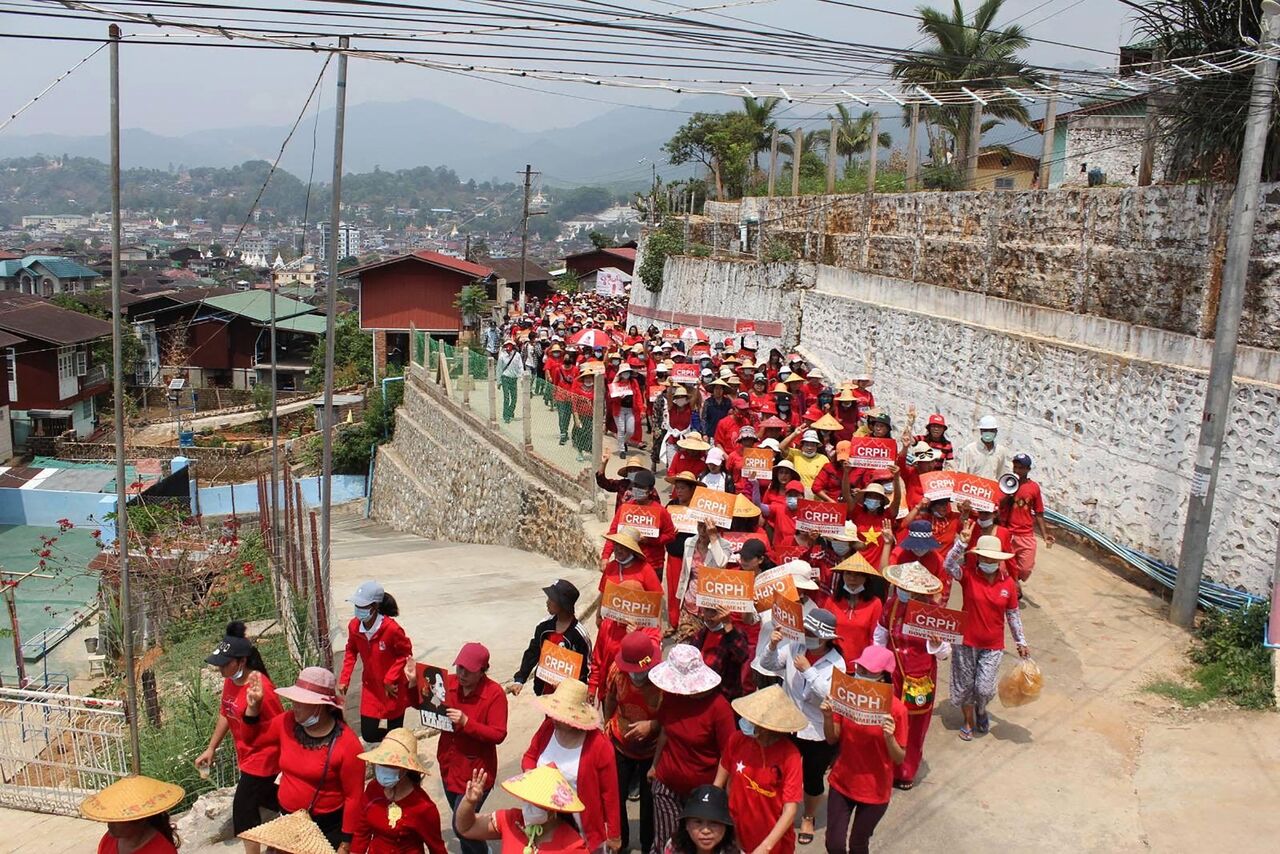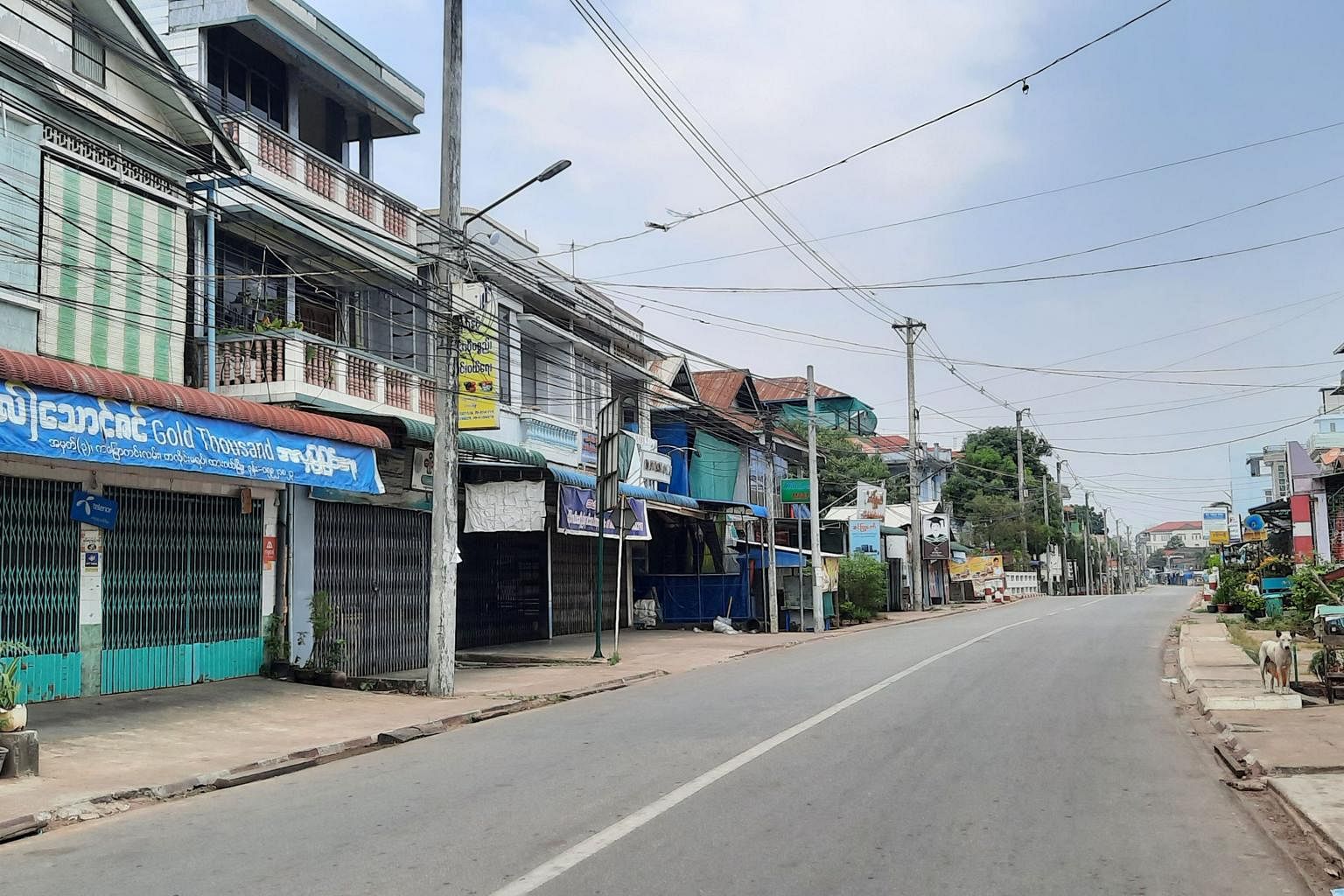Opponents of Myanmar coup announce unity government, aim for ‘federal democracy’
Sign up now: Get insights on Asia's fast-moving developments

People have been taking to the streets day after day to demand the restoration of democracy.
PHOTO: AFP
YANGON (REUTERS) - Opponents of Myanmar's junta announced a National Unity Government on Friday (April 16) including ousted members of parliament and leaders of anti-coup protests and ethnic minorities, saying their aim was to root out military rule and restore democracy.
Myanmar has been in violent turmoil since a Feb 1 coup that ousted a civilian government led by democracy champion Aung San Suu Kyi, which had held power for five years and was starting its second term after a landslide election victory in November.
People have been taking to the streets day after day to demand the restoration of democracy, defying crackdowns by the security forces in which more than 700 people have been killed, according to a monitoring group.
At the same time, political leaders, including ousted MPs from Ms Suu Kyi's party, have been trying to organise to show the country and the outside world that they and not the generals are the legitimate political authority.
"Please welcome the people's government," veteran democracy activist Min Ko Naing said in a 10-minute video address announcing the formation of the National Unity Government.
While setting out few positions, Mr Min Ko Naing said the will of the people was the unity government's priority, while acknowledging the scale of the task at hand.
"We're trying to get this out from the roots so we have to sacrifice a lot," he said, referring to the junta.
A spokesman for the junta could not be reached for comment.
The generals justified their takeover with accusations of fraud in the November election won by Suu Kyi's party, though the election commission dismissed their objections.
One of the unity's government's primary objectives will be to win international support and recognition.
Its minister of international cooperation, Dr Sasa, told reporters the United States and Britain had recognised Venezuelan opposition leader Juan Guaido as the legitimate leader of that country.
"We are the democratically elected leaders of Myanmar," said Dr Sasa, who goes by one name. "So if the free and democratic world rejects us that means they reject democracy."
International pressure has also been building on the Myanmar military, particularly from Western governments that have imposed limited sanctions, though the generals have a long record of dismissing what they see as outside interference.
The unity government released a list of office holders including members of ethnic minorities and protest leaders, underlining the unity of purpose between the pro-democracy movement and autonomy-seeking minority communities, some of whom have battled the central government for decades.
Suu Kyi, who has been in detention since the coup, was listed as state counsellor, the post she held in government.
Her only known communication with the outside world has been through monitored video calls with her lawyers.
A spokesman for the democratic politicians said while they could not inform her of the creation of the unity government, he was sure she was aware of what was happening.
Dr Sasa told Reuters in an interview the objective was to end violence, restore democracy and build a "federal democratic union".
The military, while playing lip service to the idea of federalism, has long seen itself as the core power holding the country together.
Unity government leaders said they intended to form a federal army and were in talks with ethnic minority forces.
The Special Advisory Council for Myanmar, a group of international experts including former United Nations officials, hailed the creation of the NUG as historic and said it was the legitimate government.
After darkness fell over Myanmar's biggest city Yangon, people clapped at their windows and chanted "our government", video posted by activists on Twitter showed.
Some community groups reported the sound of explosions and gunfire shortly afterwards.
Federal army

An empty street and closed shops in Dawei, as demonstrators called for a "silent strike" in protest against the military coup in Myanmar, on March 24, 2021.
PHOTO: AFP
While the politicians were announcing the unity government, other opponents of military rule observed a "silent strike" staying home to mourn those killed or wearing black in small marches in several cities and towns.
"The most silent voice is the loudest," protest leader Ei Thinzar Maung posted on her Facebook page.
Streets in the main city of Yangon were largely deserted, residents said, while black-clad protesters held small rallies in half a dozen cities and towns, media reported.
There were no immediate reports of violence at protests on Friday but six people were killed in a shootout between soldiers and a "local group" in the central town of Kani the previous day, the Myanmar Now media agency reported.
The military has also been rounding up its critics and state media announced arrest warrants for 20 doctors on charges of encouraging dissent in the armed forces.
The junta is seeking more than 200 people, including several internet celebrities, actors and singers, on the same change..
The turmoil has alarmed Myanmar's neighbours in South-east Asia, which have been trying to encourage talks between the rival sides.
South-east Asian leaders will meet in Indonesia on April 24 to discuss the situation, Thai and Indonesian media reported.
Junta leader Min Aung Hlaing was due to attend, a Thai broadcaster said, but the Jakarta Post said it had not been confirmed whether the summit would include representatives of the junta or the former government.
Dr Sasa said Asean should not invite "murderer-in-chief" Min Aung Hlaing to the summit.
The European Union has agreed to impose sanctions on another 10 individuals linked to the coup and to target two businesses run by the armed forces for the first time in protest at the military takeover, two diplomats said.


